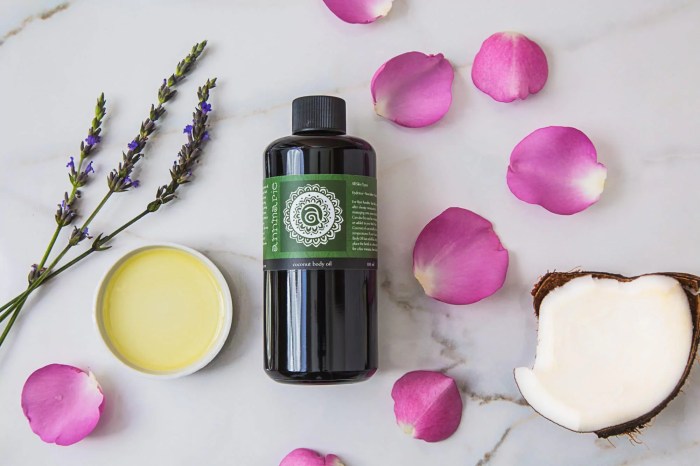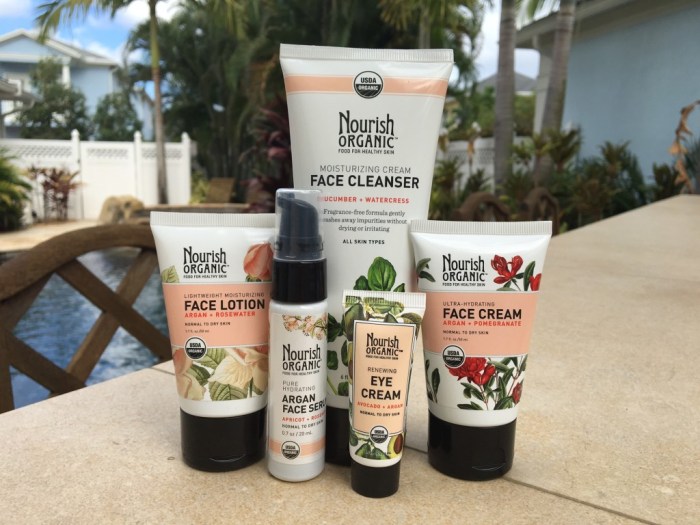
Addressing Common Skin Concerns with Organic Skincare

Organic skincare offers a natural approach to addressing various skin concerns, leveraging the power of plant-based ingredients to promote healthy, radiant skin. While not a miracle cure-all, organic formulations often contain potent antioxidants and anti-inflammatory compounds that can effectively target specific issues, minimizing potential side effects associated with synthetic alternatives. The effectiveness, however, can vary depending on the specific ingredients, individual skin type, and the severity of the condition.
Organic Skincare for Acne Treatment
Acne, a common skin condition characterized by inflamed pimples, is often effectively treated with organic ingredients. Tea tree oil, known for its potent antibacterial properties, is a popular choice. Similarly, aloe vera, with its soothing and anti-inflammatory qualities, can help reduce redness and inflammation. Salicylic acid, derived from willow bark, is another effective organic ingredient that exfoliates the skin, preventing clogged pores and reducing acne breakouts.
The efficacy of these treatments often depends on the concentration of the active ingredient and the consistency of application. For instance, a high-concentration tea tree oil treatment may be more effective for severe acne, while a lower concentration may suffice for mild cases.
Addressing Hyperpigmentation with Organic Ingredients
Hyperpigmentation, the appearance of dark spots or patches on the skin, can be addressed through the use of several organic ingredients. Vitamin C, a powerful antioxidant found in various fruits and vegetables, helps inhibit melanin production, thus lightening dark spots. Licorice root extract, rich in glabridin, possesses skin-lightening properties and effectively reduces the appearance of hyperpigmentation. Furthermore, alpha-hydroxy acids (AHAs) like lactic acid (derived from milk) and glycolic acid (derived from sugarcane) gently exfoliate the skin, promoting cell turnover and reducing the visibility of dark spots.
However, it’s important to note that consistent use is crucial for noticeable results, and sun protection is essential to prevent further hyperpigmentation.
Organic Solutions for Signs of Aging
Organic skincare offers various solutions for combating the visible signs of aging. Retinol, although technically a derivative of Vitamin A, is often found in organic skincare products. It stimulates collagen production, improving skin elasticity and reducing wrinkles. Hyaluronic acid, a naturally occurring substance in the skin, attracts and retains moisture, resulting in plumper, more hydrated skin, thus minimizing the appearance of fine lines and wrinkles.
Antioxidants like green tea extract and pomegranate extract protect the skin from free radical damage, which is a major contributor to aging. The effectiveness of these treatments varies based on individual skin conditions and the product formulation, necessitating consistent use and potentially a combination of treatments for optimal results.
Comparison of Organic Treatments for Skin Issues
Different organic ingredients offer unique benefits in addressing specific skin concerns. While some, like tea tree oil, focus on antibacterial properties for acne treatment, others, such as Vitamin C, target hyperpigmentation by inhibiting melanin production. Similarly, retinol and hyaluronic acid address aging by stimulating collagen production and hydrating the skin, respectively. The optimal treatment often involves a combination approach, tailoring the ingredients to individual needs and skin type.
For example, a combination of tea tree oil and aloe vera might be effective for acne-prone skin, while a serum containing Vitamin C and hyaluronic acid could address both hyperpigmentation and aging concerns.
| Ingredient | Acne | Hyperpigmentation | Aging |
|---|---|---|---|
| Tea Tree Oil | High | Low | Low |
| Aloe Vera | Medium | Low | Low |
| Salicylic Acid (Willow Bark) | High | Medium | Low |
| Vitamin C | Low | High | Medium |
| Licorice Root Extract | Low | High | Low |
| Retinol | Low | Medium | High |
| Hyaluronic Acid | Low | Low | High |
| Green Tea Extract | Low | Low | Medium |
| Pomegranate Extract | Low | Low | Medium |
Sustainability and Ethical Considerations

Organic skincare offers a pathway to healthier skin, but its impact extends beyond individual well-being. A truly holistic approach necessitates a deep understanding of the environmental and ethical implications inherent in the production and sourcing of these products. Choosing organic skincare should not only benefit your skin but also contribute to a more sustainable and equitable world.The environmental impact of organic skincare production is multifaceted.
While organic farming practices generally minimize the use of harmful pesticides and fertilizers, reducing pollution of soil and water, the overall environmental footprint depends on various factors. Transportation of ingredients, packaging materials, and energy consumption during manufacturing all contribute to the carbon footprint. However, the commitment to organic farming methods, when implemented responsibly, generally results in a smaller environmental impact compared to conventional skincare production.
This is because organic farming reduces the use of synthetic chemicals that can contaminate ecosystems and harm biodiversity.
Ethical Sourcing of Ingredients
Ethical sourcing ensures fair treatment of farmers and workers involved in the production of organic skincare ingredients. This includes fair wages, safe working conditions, and respect for local communities and their environments. Many organic ingredients are sourced from developing countries, making it crucial to ensure that these communities benefit from the global demand for these products, rather than experiencing exploitation.
Transparency in supply chains is paramount, allowing consumers to trace the origin of ingredients and verify the ethical practices employed throughout the process. For instance, a brand might highlight partnerships with cooperatives of small farmers in specific regions, detailing fair trade practices and community development initiatives.
Brands Committed to Sustainable and Ethical Practices
Several brands actively champion sustainable and ethical practices within the organic skincare industry. These companies often prioritize transparency, using clear labeling to inform consumers about their sourcing and production methods. They might invest in renewable energy sources for their manufacturing processes, minimize packaging waste through the use of recycled or biodegradable materials, and actively support environmental conservation projects. Examples include brands that are certified by organizations like B Corp, which verifies a company’s commitment to social and environmental responsibility, or those participating in Fair Trade initiatives.
Specific brand names are omitted to avoid appearing to endorse any particular company, as the landscape of ethical and sustainable brands is constantly evolving.
Tips for Sustainable Organic Skincare Choices
Making conscious choices as a consumer is crucial in driving the industry towards greater sustainability and ethical practices. Consider these tips when purchasing organic skincare products:
- Look for certifications: Seek out products certified by reputable organizations that verify organic farming practices and ethical sourcing.
- Minimize packaging: Choose products with minimal packaging or those using recycled and biodegradable materials.
- Support brands with transparency: Select brands that openly communicate their sourcing practices and commitment to sustainability.
- Buy less, choose well: Reduce your overall consumption by focusing on high-quality, long-lasting products rather than accumulating numerous items.
- Consider refills and reusable containers: Opt for brands offering refill options or products in reusable packaging to reduce waste.





